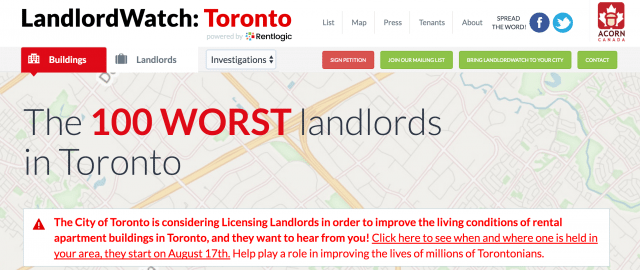Torontoist: What Toronto’s Potential Landlord Licensing Program Would Look Like
Posted August 30, 2016
Council voted to explore next steps for a program in June. We explore what that means for tenants.
Posted August 30, 2016
 I remember being a bright-eyed, innocent first-time renter two years ago. My best friend and I were moving to Toronto and into our first apartment together, and we were clueless about the signs to look out for to avoid getting burned before signing a lease. All we had agreed on wanting a “cute kitchen” and a nice patio. We soon learned it’s not so simple.
I remember being a bright-eyed, innocent first-time renter two years ago. My best friend and I were moving to Toronto and into our first apartment together, and we were clueless about the signs to look out for to avoid getting burned before signing a lease. All we had agreed on wanting a “cute kitchen” and a nice patio. We soon learned it’s not so simple.After some searching, we walked out of a rental office building off of Sherbourne and Wellesley feeling confident after freshly filling out the application for a unit. The rent was reasonable, it was close to both of our schools, and we had a great view. We happened to bump into two people our age, who asked us if we were planning on moving in. We nodded.
The pair, it turns out, were just moving out because of the building’s cockroach infestation, an incoming year-long construction notice, and a recent stint with bedbugs—all details the landlord failed to mention to my friend and me five minutes prior. Luckily for us, we were able to Google the building and see all of the horrifying reviews for ourselves. One post read, “Get out while you still can.”
But not all apartment renters in the city have the chance to get out of a lease in a bad building, and in many cases, do not have a choice. However, after City Council voted overwhelmingly in favour of taking the next steps toward a landlord licensing program for Toronto apartment buildings this past June, there has been hope for better tools to ensure improved living conditions, especially for those in the low- to middle-income bracket.
Although this is good news for tenants, there is still a lot of work to be done before the program can be approved. Here’s a guide to the status of the program, what feedback has been collected so far, and who the major players pushing the program further are.
The process
If you ask Marva Burnett, ACORN national president, licensing landlords has been a long time coming.
Burnett, who personally lived in a notoriously bad building on the Danforth, says the fight for landlord licensing is one of ACORN’s biggest campaigns, with members collecting work orders and knocking on tenants’ doors to discuss issues in buildings all over the GTA since 2004. (ACORN Canada is an organization that represents low-income communities across the country.) After several City councillors came to their meetings, some included the idea of a program in their political platforms. In June, the City voted 33-6 in favour of further exploring the idea and proposing a bylaw.
“We wish that it would’ve moved faster but we got in there,” Burnett says. “We wanted more than building inspections. Instead of ACORN having to go one building one at a time, why not get all of the changes for all of the buildings all at once?”
Intiaz Ruffudeen is the manager of policy and planning with the Municipal Licensing Standards division of the City of Toronto and is developing the bylaw for City Council approval. At the moment, it is still being drafted. “We haven’t finalized anything and we can’t until City Council approves what the program could look like,” he says.
Public consultations will help shape the bylaw; seven are already scheduled. These consultations come after the vote to approve the proposal, which will give the public and stakeholders, such as the tenants and landlords themselves, the opportunity to speak to the Municipal Licensing and Standards Committee to get a sense of what the City is planning to do and contribute to the decision making process.
So far, Ruffudeen says tenants are bringing forward helpful suggestions regarding what they’d like to see in the bylaw. For instance, tenants have suggested a similar system to the DineSafe health inspections in restaurants for apartment buildings, with a pass/fail grading to help those searching for a new residence know which buildings to look at and which ones will be good to live in.
After the public consultations are complete, the feedback will be taken back to City Hall and the Tenant Issues Committee, Licensing Standards. Then City Council will debate and vote on the proposed program at its December meeting. If the program is approved, the City will implement the recommendations and create a bylaw to reflect them, along with a communication plan. From there, the City will pick a date to implement it. Best case scenario, Ruffudeen says, the program could be launched by next year.
The program
Even though it could be a while before the program is actually enforced, the Municipal Licensing Standards division of the City is discussing potential features both tenants and landlords will benefit from.
According to a document prepared by the Advocacy Centre for Tenants Ontario this month, there are eight points that the licensing program should aim to accomplish:
- Provide financial resources to improve state of repair in buildings
- Complement the existing direct service to tenants of in-suite inspections through the 311 service and the MRAB audits
- Create a system of fines and administrative penalties for repeat offenders and ongoing violations
- Ensure continuation of tenancies in safe conditions
- Provide open access to all available information about the properties, landlords, landlord plans and processes
- Remove barriers to the City carrying out remedial work
- Provide timelines for compliance with violations of licensing requirements
- Include input from tenants in assessing landlord compliance with licensing requirements
Ruffudeen says the licensing program would improve the overall living conditions for tenants, highlighting building maintenance and tenant engagement.
As part of the program, Ruffudeen says the committee is also looking at having landlords and property owners develop plans for maintenance and cleaning, recycling and waste, and state of good repair and capital.

Yale Fox, CEO of Rentlogic and the data scientist behind Landlord Watch, which lobbied for the implementation of a program earlier this year, is hopeful that the program includes “financial penalties as a flat rate, or at least one that reflects the cost of the building.” Currently there’s a re-inspection fee, but no fine.
“When landlord licensing was brought up before, [we were told] there are only a couple of bad landlords. You hear that all the time,” he says. “Nobody knows how many bad landlords there are, because there’s not enough data or inspections.”
Ruffudeen says having City staff conduct more regular inspections would be a valuable addition to the plan, which will hopefully ensure complaints with other applicable regulations and laws, like the fire code or electrical safety issues.
The promise for more inspections is a huge talking point among other major players campaigning for the programming, such as ACORN.
While the multi-residential apartment building audit program, or MRAB, was implemented in 2008 to deal with complaints from tenants, ACORN spokesperson Natalie Hundt says it’s not enough to address the whole city because there are so few inspectors, and they only come when they are contacted.
“That’s just not efficient because you will miss so many problems if you only come after. Imagine restaurants only having an inspection after people got sick,” Hundt says. “The laws in the city don’t have teeth. They aren’t strong enough.”
Fox says nobody knows how many bad landlords there are because there are not enough inspections or data. And many people won’t want to call for an audit because they fear repercussions from their landlords. ACORN hopes the plan will expand MRAB, have more inspectors for every building, and inflict higher fines for problems.
Ruffudeen agrees, noting that the licensing of the landlord program would incorporate the best of the MRAB program, and “add to it to make it more comprehensive to ensure tenants have access to information to taking what we do and building a better program from it.”
Among the most crucial points to be implemented in a potential licensing program is tenant engagement. Ruffudeen says the City’s website will be expanding its resources and offering more information, such as showing outstanding orders on a building, which buildings are being audited, and where charges have been laid. Landlords would also have to provide information, such as when there’s going to be a service disruption on an elevator, or when the City is conducting an inspection or audit on a building.
Providing tenants access to more information they need to make an informed decision on where they choose to live, Ruffudeen says, is the ultimate goal.
The people
ACORN members are ecstatic about the possibility of a bylaw.
Melissa McIntyre is one of them. “I’m infested with cockroaches, and I keep all my traps because people just don’t believe it,” she says. “I have to leave my kitchen and my two bathroom lights on 24 hours a day because the cockroaches are just everywhere.” She has been a resident at her building in Scarborough for five years. Her superintendent, who is also the building maintenance person, gave her an unmarked bathroom-cleaning bottle filled with what he told her was roach spray.
“I’d love to move but I’m attached to the building. I don’t want to give up on it. I like living here,” McIntyre says. “Everybody wants to work together and live in a proper building we should have that right, and we shouldn’t have to move because he should be accountable for how he makes us live.”
Another member, Joy Ruscitti-Hayes, lives at 126 Bellamy Road North–the second worst building in Scarborough according to City data on Landlord Watch. When new management “changed the rules almost overnight,” rents went up and the landlord would go through apartments without notice. Tenants were terrified.
In the last six months, Ruscitti-Hayes says she has been threatened with eviction eight times for damages she did not commit. She’s won every case. For 17 months in 2014, the garbage chute in her building was locked, requiring tenants, even the elderly and those with disabilities, to walk their garbage down. “I got tired of taking my garbage outside,” she says. “We went to court, and the judge ordered the landlord to pay each of us $525.”
At one point, she thought about moving. She looked into another building, but as she was walking up to it, a forensic vehicle had pulled up because someone had been murdered. “I thought, ‘better to live with the devil I know than the devil I don’t,’” she says.
Hundt is hopeful that the program will be approved, because the current situation is abusive and a serious health issue.
“When we pass this eventually—not if, but when, because we won’t stop and we don’t have a choice—this will set a president and improve conditions for people everywhere,” she says.
And maybe, in a future with a landlord licensing program, Torontonians won’t end up like my old roommate and I, scouring through Google to find a place to call home—sans cockroaches.
Tenants have the opportunity to speak to City staff and contribute to the decision making process. Check out the City’s website for more information.
***
Article by Leah Lalich for The Torontoist
